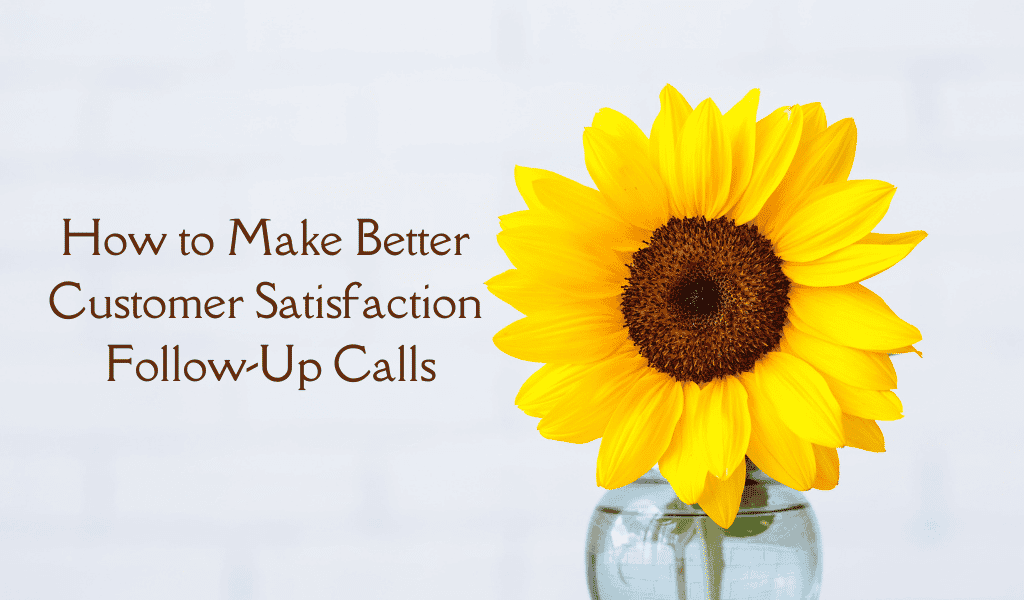There’s customer satisfaction; then there’s customer satisfaction follow-up. Unfortunately, the follow-up gets glossed over far too often.
Anyone in sales or service-related fields understands the importance of customer satisfaction. We all want our customers to be happy with the products or services they get from us. What gets lost as we move along, however, is the importance of customer satisfaction follow-up.
Things change, and the perfect customer experience may not be so perfect down the road if there are unforeseen issues. For example, maybe the automatic payment on your customer’s insurance policy came out twice. Perhaps the gym membership isn’t getting used. It’s possible the most recent update to your SaaS subscription left some of your customers without a favorite feature.
There are so many reasons customer satisfaction follow-up is vital to the health of an organization. Yet, in so many instances, it’s barely even an afterthought. There might be an email survey or questionnaire. But an actual phone call with a real person? When was the last time you received one of those calls?
The fact is, these calls can do wonders. With a quick phone call, you can upsell new services, engage customers and clients, and put in a good word for referrals. You can also solve a problem, learn about overall issues with your service or product, find out how easy or challenging it is for customers to onboard, or turn a dissatisfied customer into someone who champions your organization.
Here’s how to make those calls work for you and your customer to achieve the best outcomes for everyone.
Make more calls in less time with Call Logic. From automated voicemails to built-in compliance, we’ve got you covered in every aspect of your business. Call for your free consultation today to learn more!
Making customer satisfaction follow-up calls your secret to success
The first step to making the best customer satisfaction follow-up calls is understanding how your customer wants to be contacted. A phone call is ideal, of course, because it’s personal and immediate. But some people prefer to text or email. So if they explicitly state that they would rather receive a text or email over a call, then that’s what you have to go with.
For now, though, let’s talk about phone calls. What makes a good customer satisfaction follow-up call?
1. Timing. Quite simply, call when you say you’ll call. There’s no prescribed timeline here. It depends on the product or service. If you’re installing pools, maybe it’s a week after the work is complete. If you’re a real estate agent, you might call a client a couple of weeks after a sale to check in with them. You know better than anyone what that timing looks like. Again, though, the point is that if you tell a customer you’ll call next Tuesday, then make sure it’s on your calendar to call next Tuesday.
2. Say thanks. A good old-fashioned “thank you” goes a long way in keeping customer relations positive. This doesn’t need to be anything fancy. “Hi. I’m calling to say thanks for trusting us with your business. Is there anything you have questions about with your new service?”
3. Share features. Are there aspects of your product or service that customers don’t take advantage of? Make sure they know about them and what they are. That can add a lot of value to the relationship for your customers and increase their level of satisfaction.
4. Upsell only if it’s appropriate. It can be tempting to upsell or cross-sell products or services when you’re making customer satisfaction follow-up calls. Resist that urge. Trying to upsell when you are purportedly calling to check on a customer’s happiness brings suspicion into the call. It makes your customers feel less cared about rather than more. Be aware, however, that this isn’t always true. It is okay to make additional offers available if it feels natural and the conversation is going that way. Just be very careful with this.
5. Be empathetic. Not all of your customer satisfaction follow-up calls will go well. You may have very unhappy customers for any number of reasons. Whether or not the complaint is accurate, sometimes the best thing you can do is just listen. Of course, if the complaint is one you can do something about, then you probably should fix the issue. But you don’t want to argue with an unhappy customer. You can troubleshoot with them and figure out if there’s some way to make the situation better. You can even hear them out and then offer to look into the issue and call them back. Just don’t argue.
Perhaps what’s most important for customer satisfaction, both initially and in following up, is to just be real. People are more likely to work with you on solving issues when you genuinely care about their experience. It’s truly the ultimate in customer service.
Call Logic’s auto-dialer and call management software offers dozens of helpful tools to increase your success and simplify your daily tasks. Call for your free consultation today to learn more!

